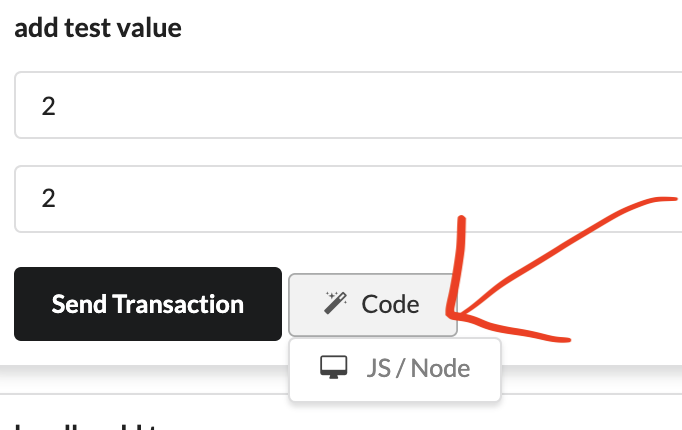Hey everyone,
I called the smart contract on the mainnet using js-sdk. After receiving txHash I awaited for the confirmation using waitTxConfirm(hash) sdk function. Then after 1 confirmation , I get tx not found when querying for the hash.
- contract call result:
result {
hash: 'th_N7G5dWz37z9S7Y5BeFQLinbS8wHmCQz5vw4YUvhKv9T3jE3Bz',
rawTx: 'tx_+M8LAfhCuECjFoQ0+53xZfWQQwGOFXJjM6EkR/03RcKIuuiDAEUCGQLR/mUaGQmEFf3Dr1dkwqdTs5h00HqV2NqCu8NqZqYMuIf4hSsBoQF7YX+i6NHksXm84S2CbftFuVDwlUQtUDM6obp+Mxm+vBGhBZB9g8MTrxWORZZaF9lmtDHRgJtsebWAZIyM8aGcvW+UA4amKiiZuAAAAIMYF/iEO5rKAKorEUzXC5YbnwCgFjlt1rf7HwH32MH58v+LNJCDW1+SWsqUGPAIDDxvE5CWG2Ts',
result: {
callerId: 'ak_wLbhjhs2TZ3vztaK9hb8rKRDBjip3N4xqDKLtAhvcwRMyCUmA',
callerNonce: 17,
contractId: 'ct_26dp1nJUjMrbpbGdvduwA4J8FsYVU5uEBXwq7xwoSmyHxaRgYL',
gasPrice: 1000000000,
gasUsed: 1887,
height: 397965,
log: [ [Object] ],
returnType: 'ok',
returnValue: 'cb_P4fvHVw='
},
txData: {
blockHash: 'mh_2S3fEPFn1LN5pN79mU96VcCAC3Rxa4ngszaJ5Raii3gvBbiS7c',
blockHeight: 397965,
hash: 'th_N7G5dWz37z9S7Y5BeFQLinbS8wHmCQz5vw4YUvhKv9T3jE3Bz',
signatures: [
'sg_NLX9XkEbApNG2jj5Nnr5HgUpRG4KNTgCicAPUmgEPy9xBAW2THa48Vre4ckNCPtnyh32i6uwTydQFot9ddARwTHbQbLjk'
],
tx: {
abiVersion: 3,
amount: 0,
callData: 'cb_KxFM1wuWG58AoBY5bda3+x8B99jB+fL/izSQg1tfklrKlBjwCAw8bxOQ1BPABQ==',
callerId: 'ak_wLbhjhs2TZ3vztaK9hb8rKRDBjip3N4xqDKLtAhvcwRMyCUmA',
contractId: 'ct_26dp1nJUjMrbpbGdvduwA4J8FsYVU5uEBXwq7xwoSmyHxaRgYL',
fee: 182700000000000,
gas: 1579000,
gasPrice: 1000000000,
nonce: 17,
type: 'ContractCallTx',
version: 1
},
callerId: 'ak_wLbhjhs2TZ3vztaK9hb8rKRDBjip3N4xqDKLtAhvcwRMyCUmA',
callerNonce: 17,
contractId: 'ct_26dp1nJUjMrbpbGdvduwA4J8FsYVU5uEBXwq7xwoSmyHxaRgYL',
gasPrice: 1000000000,
gasUsed: 1887,
height: 397965,
log: [ [Object] ],
returnType: 'ok',
returnValue: 'cb_P4fvHVw=',
rawTx: 'tx_+M8LAfhCuECjFoQ0+53xZfWQQwGOFXJjM6EkR/03RcKIuuiDAEUCGQLR/mUaGQmEFf3Dr1dkwqdTs5h00HqV2NqCu8NqZqYMuIf4hSsBoQF7YX+i6NHksXm84S2CbftFuVDwlUQtUDM6obp+Mxm+vBGhBZB9g8MTrxWORZZaF9lmtDHRgJtsebWAZIyM8aGcvW+UA4amKiiZuAAAAIMYF/iEO5rKAKorEUzXC5YbnwCgFjlt1rf7HwH32MH58v+LNJCDW1+SWsqUGPAIDDxvE5CWG2Ts'
},
decode: [Function: decode],
decodedResult: [],
decodedEvents: [
{
address: 'ct_26dp1nJUjMrbpbGdvduwA4J8FsYVU5uEBXwq7xwoSmyHxaRgYL',
data: 'cb_Xfbg4g==',
topics: [Array],
name: 'WalletAdded',
decoded: [Array]
}
]
}
- await confirmation
await client.waitForTxConfirm("th_N7G5dWz37z9S7Y5BeFQLinbS8wHmCQz5vw4YUvhKv9T3jE3Bz", { confirm: 1, interval: 20000, attempts: 40 })
height = await client.height()
console.log("fetched height", height)
The height output is: 397966.
But I queried for the hash and received the Tx Not Found status. I looked for the micro block and I can see it here: mh_2S3fEPFn1LN5pN79mU96VcCAC3Rxa4ngszaJ5Raii3gvBbiS7c - Micro block transactions of Aeternity - AEKnow
My transaction is there but can’t open the details, the details are: NULL.
What is the issue here? And what is the proper way for awaiting the transaction to be mined? Thanks!


 How to distinguish successful and failed contract deployments?
How to distinguish successful and failed contract deployments? 